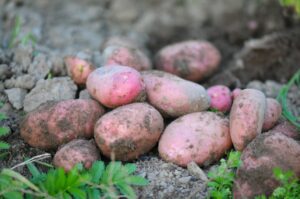May 1, 2023MSU to use $750,000 grant to research potato early die complex
Michigan State University researchers will use a $750,000 federal grant to develop sustainable methods of managing potato early die complex.
Marisol Quintanilla, a nematologist and assistant professor in the MSU Department of Entomology, will lead the project, funded by the U.S. Department of Agriculture’s National Institute of Food and Agriculture.

Michigan ranks eighth nationally in potato production, with more than 46,000 acres and 1.7 billion pounds harvested annually, according to the university. The potato industry contributes more the $1.24 billion to the state’s economy, according to data from the Michigan Potato Industry Commission.
Michigan also leads the nation in producing potatoes for use in chips.
Potato early die complex is one of the greatest challenges facing potato growers, with the potential to reduce yields by as much as 50%. It is caused by the convergence of a fungus, Verticillium dahliae, and nematode, Pratylenchus penetrans, which compromises the plant’s health before it reaches maturity.
Previous research has shown that other pathogens may also influence the disease.
Other MSU scientists involved in the research project include:
- Luisa Parrado, a doctoral student in Quintanilla’s laboratory who helped author the project proposal.
- Henry Chung, an assistant professor in the Department of Entomology.
- Jennifer Pechal, an assistant professor in the Department of Entomology.
- Chris Long, a potato extension specialist in the Department of Plant, Soil and Microbial Sciences.
- Jaime Willbur, an assistant professor in the Department of Plant, Soil and Microbial Sciences.
Guiping Yan, an associate professor from North Dakota State University, will also contribute to the research.
In a recent survey of Michigan potato growers conducted by Willbur, 45% said potato early die complex was a top-three disease concern, while 42% said current management strategies need to be improved.
The most common current treatment is fumigation, which has negative effects on the soil microbiome and can reduce the efficacy of biological controls.
Quintanilla believes these biological controls may hold the key to better management.
“Our previous research has concluded that poultry manure and a compost blend are effective at reducing P. penetrans populations and improving potato yield,” Quintanilla said. “The pesticidal effect of these products is not fully understood, but literature suggests that it is attributed to a combination of mechanisms, including the activity of microbial communities that reside in these amendments.”
The goal of the new project is to provide insights on a compost blend that has the desired antimicrobial characteristics to fend off potato early die complex.
Research will take place in the field and the laboratory. Two experiments will be hosted at a farm in southwest Michigan with a history of potato early die complex. Those experiments will be replicated in North Dakota.
Extension materials will be created for use online and in print, including a potato management handbook available in English and Spanish.
“Growers will be heavily involved in the process, because this research is really geared toward meeting their needs,” Quintanilla said. “We want to make sure the resources we generate are accessible to as many growers as possible.”







